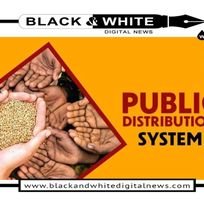Massive PDS Overhaul in Jammu and Kashmir Exposes Nearly a Million Bogus Beneficiaries: Aadhaar Integration Reshapes Subsidized Ration Distribution.
||Black and White Digital News||
||October 01 ,2024 ||
Jammu : In a major drive to enhance the Public Distribution System (PDS) in Jammu and Kashmir, nearly one million ineligible individuals who were fraudulently availing subsidized rations have been removed, a revelation made during a review meeting chaired by the newly appointed Food, Civil Supplies, and Consumer Affairs (FCS&CA) Minister Satish Sharma. Thanks to the integration of Aadhaar with PDS records, officials have successfully eliminated a large number of fake entries that were exploiting the system, bringing greater transparency and efficiency to the food distribution network across the Union Territory.
The meeting, held with key officials including Rural Development Minister Javid Ahmad Dar and Commissioner Secretary of FCS&CA, Zubair Ahmad, highlighted the significant strides made in recent years to reform Jammu and Kashmir’s distribution system. It marked Minister Sharma’s first departmental review, setting a clear direction for a streamlined, technology-driven approach to the PDS.
Reforms and Technological Integration:
Over the past five years, Jammu and Kashmir’s PDS has undergone substantial improvements aimed at plugging leaks, strengthening accountability, and ensuring that subsidized food supplies reach the most deserving. Aadhaar integration has been instrumental in these reforms, with all ration cards now seeded with Aadhaar numbers, allowing authorities to identify duplications and fraudulent beneficiaries. This effort has resulted in the removal of over one million bogus beneficiaries, safeguarding precious resources for the rightful recipients.
Commissioner Secretary Zubair Ahmad emphasized that this transformation, achieved through an innovative blend of technology and administrative vigilance, marks a significant step forward in service delivery. “The introduction of e-verification has not only rooted out fake ration cards but has also paved the way for an efficient and fair system,” Ahmad remarked.
New Additions and Inclusive Coverage:
Jammu and Kashmir’s PDS now serves approximately 24.80 lakh ration cardholders, covering 96.74 lakh residents, a network that has been refined to incorporate 100% Aadhaar seeding. In a notable initiative, around 8.66 lakh new beneficiaries, previously excluded, have been added in the past two years. Among them are registered laborers on the e-Shram portal, a government effort that provides social security to unorganized workers across the country. This inclusion drive is part of a broader strategy to ensure that all citizens, especially the economically vulnerable, have access to essential services.
The department has also identified gaps in coverage, particularly among children born between 2011 and 2016. Efforts are underway to incorporate these young dependents into the system, ensuring that every family’s needs are accounted for. Furthermore, the department is collaborating with the National Informatics Centre (NIC) to open additional Fair Price Shops (FPS) at strategically identified locations to meet the growing demand and improve accessibility.
Ministerial Vision for a Robust Distribution Network:
Minister Sharma’s review reflected a focused vision for a robust, people-centered PDS that operates with efficiency and fairness at its core. In his address, he underscored the importance of technology and vigilance in curbing malpractices. “Our aim is to build a system that serves every deserving household while eradicating any form of leakages. The integration of Aadhaar with the PDS has set a new benchmark in transparency, and we will continue to build on this foundation,” Sharma stated, reinforcing the government’s commitment to a sustainable and transparent distribution mechanism.
In echoing these sentiments, Rural Development Minister Javid Ahmad Dar added, “Ensuring that essential supplies reach those in need is not only a duty but a right of every citizen. We will work relentlessly to uphold this right.”
Future Prospects and Administrative Synergy:
The success of Aadhaar integration in the PDS has encouraged the administration to look further into data-driven solutions that can enhance service delivery across other welfare schemes. Officials present at the meeting expressed optimism about expanding similar reforms to other sectors, signaling a strong alignment across government departments for a cohesive approach to social welfare.
The systemic changes unfolding within Jammu and Kashmir’s PDS mark a transformative shift in the distribution of subsidized rations, protecting resources for genuine beneficiaries while setting a precedent for transparency and integrity. As new FPS outlets and technological advancements continue to reshape the system, the administration aims to create a model of public service that ensures accountability, equity, and trust.
This sweeping reform, spearheaded by a determined ministerial team, symbolizes a broader drive toward a governance model that puts people first and guards against exploitation, marking a new chapter for public welfare in Jammu and Kashmir.



